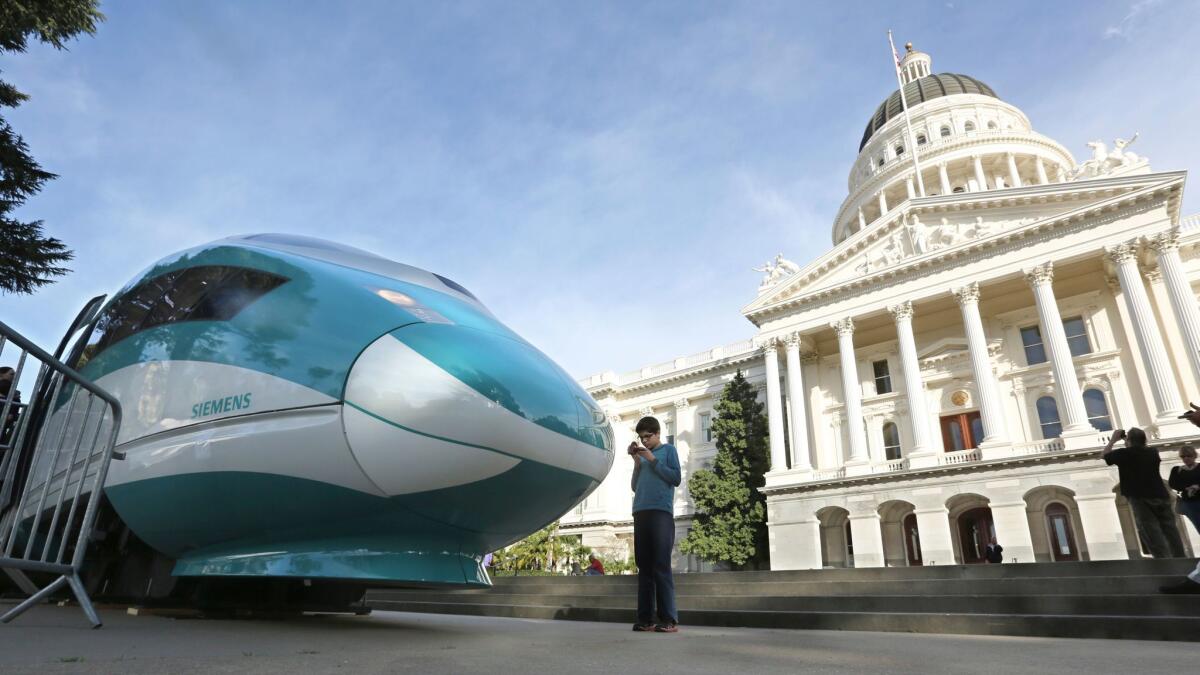Opinion: To save his climate change program, Jerry Brown sacrificed his bullet train

- Share via
When he was cajoling lawmakers to extend the centerpiece of California’s ambitious climate change program, Gov. Jerry Brown talked a lot about hard choices and the compromises necessary to get politically controversial legislation passed. Turns out that to get a deal, Brown may have sacrificed one of his own pet projects — California’s bullet train.
Brown has been the most outspoken advocate for building the high speed rail train from Los Angeles to San Francisco, which would be the first of its kind in the U.S. He has continually pressed skeptical Democrats to stay committed to the project. He’s challenged Republicans in the state and in Washington, D.C., who want to defund the rail line. And Brown pretty much saved the project in 2014 when he convinced lawmakers to dedicate 25% of all the cap-and-trade auction revenue to the train, which should provide enough money to build the first leg of the train from Merced to San Jose.
Yet Brown has been even more outspoken and committed to combating climate change, which he has called a “threat to organized human existence.”
The cap-and-trade program, which requires companies to buy permits to release greenhouse gas emissions, is central to California’s plan to reduce emissions by 40% below 1990 levels by 2030, and it’s supposed to be a model for how to cut global greenhouse gases without slowing the economy.
Will lawmakers want to pull the plug on the bullet train once they see it whizzing from farm fields to Silicon Valley?
But when lawmakers on the left and right balked at Brown’s plan to extend the program, the governor started cutting deals, left and right. One of those deals, which helped secure eight Republican votes, was Republican Assembly Leader Chad Mayes’ constitutional amendment that would give the minority party more say over how billions of dollars raised through cap and trade are spent.
High speed rail has received the most money so far from the program — $958 million — and by law the project gets one-quarter of all the funds raised through the cap-and-trade auctions. This has infuriated many Republicans who are adamantly opposed to building the bullet train but were unable to block the funding plan when it was approved by a simple majority vote in the Legislature a few years ago.
Mayes’ constitutional amendment would require a one-time, two-thirds majority vote in the Legislature in 2024 to spend the cap-and-trade revenue. Getting that supermajority would likely require negotiations with Republicans who could try to block or reduce the amount of money going to high speed rail. Of course, it’s hard to know how legislators might feel about the project in 2024. The initial segment from Merced to San Jose is supposed to start operations in 2025. Will lawmakers want to pull the plug on the bullet train once they see it whizzing from farm fields to Silicon Valley?
But first — voters would need to approve the constitutional amendment to require the special 2024 legislative vote. The amendment will be on the statewide ballot next June. It’s likely that Republicans and high speed rail critics will portray the ballot measure as a referendum on the bullet train and a chance for voters to block funding for the project — albeit in 2024.
If voters approve the constitutional amendment, that could send a message to lawmakers in Sacramento and in Washington, as well as investors, that the project does not have public support. That could hurt future efforts to secure public and private funding to build the rail line from the San Joaquin Valley to Los Angeles. And the High Speed Rail Authority wouldn’t have Brown around anymore to champion the project. He’s termed out next year.
The extension of the cap-and-trade program is certainly good for the bullet train in the short term. The project is guaranteed to get billions of dollars in revenue before 2024. However the constitutional amendment creates more hurdles and more uncertainty for a project that has been dogged by delays, cost overruns and deep skepticism over the last decade.
Brown was right to compromise to get the cap-and-trade deal, but it’s too bad that to keep California’s landmark climate change program on track he had to throw the bullet train off.
For more opinions, follow me @kerrycavan
More to Read
A cure for the common opinion
Get thought-provoking perspectives with our weekly newsletter.
You may occasionally receive promotional content from the Los Angeles Times.







